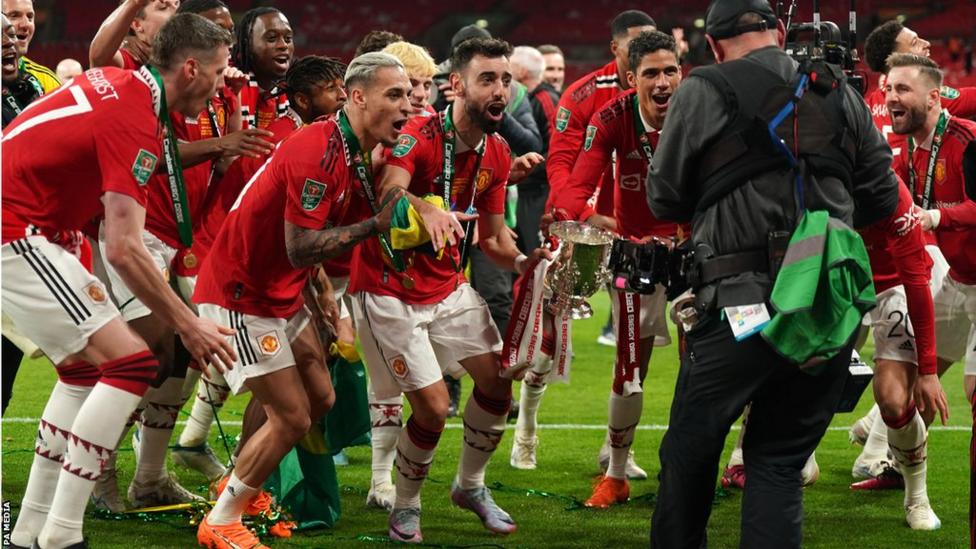Carabao Cup final showed Erik ten Hag is capable of bringing success, but it also brought ownership into sharp focus.
It wasn’t a classic final. It’s hard to imagine anybody, not even the most devout of Manchester United fans, watching it back over and over, relishing the key moments.
Here’s the bit when Antony jinked about a bit and got fouled. Here’s the bit when Rafaël Varane won a header in a crowded box. Here’s the scrappy bit when Lisandro Martínez broke up an attack. If you like angry men shouting at each other in Portuguese, then you’ll have loved this: otherwise the Carabao Cup final was a game of note less for what it was than for what it meant.
This mattered. That’s why it was so tetchy. More than 40,000 Newcastle fans had poured south and engaged in a great celebration of their identity in Trafalgar Square on Saturday. Their resources mean these occasions should become increasingly common, that it shouldn’t be another 24 years before they are in another but, for now, a final is an event to be experienced to the greatest possible degree: it may still be a once-in-a-lifetime event.
Success is more familiar for Manchester United, but it had been six years since they had won a trophy and, anyway, this seems different. For the biggest clubs there are pots picked up almost by accident, just by hanging around in the right areas with enough good players, and there are those that feel as if they may be extremely significant, part of something special, and that’s where United are now under Erik ten Hag.
Finally, a decade after Sir Alex Ferguson retired, they have a leader capable of initiating a period of prolonged success. It’s possible this final could stand, like Manchester City’s victory in the FA Cup final in 2011, Chelsea’s victory in the 2005 League Cup final and their own victory in the 1990 FA Cup final, as a major landmark: the start of a new era.
That’s what a final should be. It shouldn’t be a wearily familiar trudge. There should be a sense of jeopardy and importance. Anxiety should play its part. Moments should be memorable less for their aesthetic quality than for what they mean. In that sense, this was a final that fitted a season that has bubbled with intrigue and excitement.
Not quite two-thirds of the way through the campaign, nothing is close to being settled in the league. The fallibility of the contenders means there is a proper title race with twists and turns. There are at least three and perhaps as many as six contenders for the fourth Champions League place. No side have been cast adrift at the bottom and at least one very decent squad is likely to go down. The knockout stages of the Champions League have begun with their familiar drama. Crowds in England are at record highs.

Erik ten Hag celebrates with Lisandro Martínez (left) and Antony.
The soap opera of the game has rarely been better: there is narrative everywhere – Liverpool’s slump, Chelsea’s splurge, Everton’s crisis, Brentford’s rise. Even the supporting actors and cameos – Willian, Nathan Jones, Lord Pannick – are hitting the mark. It wouldn’t be hard to portray this as a golden age for English football, but Sunday art Wembley was also representative of the impending sense of doom.
Newcastle are majority-owned by the Public Investment Fund of Saudi Arabia. If anybody wants to be clear just how distinct this entity is from the Saudi state, consider the fund’s recent claim in a federal court in the US that it has sovereign immunity as part of a foreign government.
Manchester United may soon be taken over by Sheikh Jassim bin Hamad al-Thani, the chairman of the Qatari Islamic Bank and his father was prime minister of Qatar. The extent to which he is acting as an individual rather than as a representative of the Qatari state will be up to football’s administrators to determine.
Perhaps it’s understandable that fans, faced with legal wrangling and trying to tease out the complicated politics of the Middle East, would prefer simply to focus on the pitch, but what is depressing is how many appear obsessed with their own sense of victimhood, so fixated on the money they’ll attack anybody who questions its source. Journalists who have raised questions about sportswashing, about clubs that have stood at the centre of their communities for more than a century being used by foreign powers, were verbally abused at Wembley on Sunday.
That contributes to a sense of a game on the brink. Which of its leaders actually care for the good of football? Or if they do care, which are capable of protecting it from a possible future of rotten values, of bloated tournaments with endless games of questionable relevance, of domination by a dubious collection of state bodies, oligarchs and billionaires? But then, the League Cup was once a pointless new trophy; repetition can invest anything with the significance of tradition. Nothing is constant, but the inevitability of change does not mean it is necessarily good.
Sunday was a pleasingly old-fashioned occasion. It was spiky and tense, colourful and noisy. It had a reserve goalkeeper thrust into centre stage, a brilliant forward rediscovering his form and an ageing maestro relishing a fresh stage in his career. It had a mildly comical own goal. It was a Wembley final like they used to be, not a game for the ages, but one with enough incident to hold the attention, to provide triggers for future memories.
It may prove the herald of a new age for Manchester United, but it may also be one of the last of its kind, a memorial for the old football
















